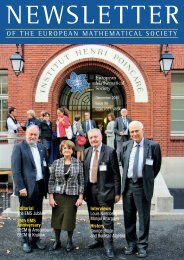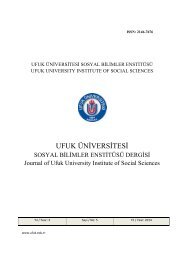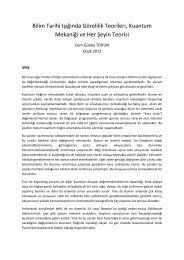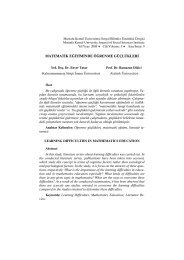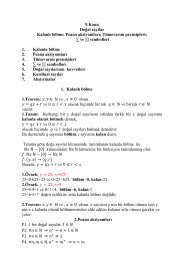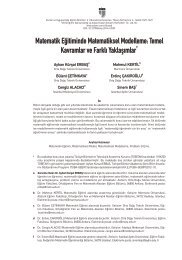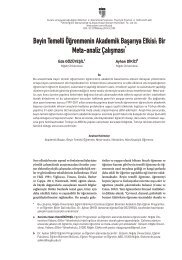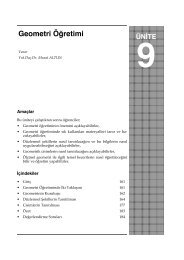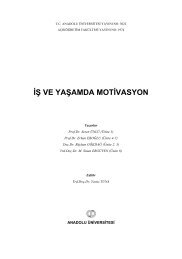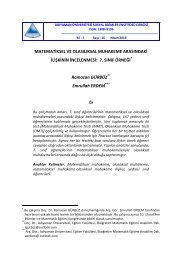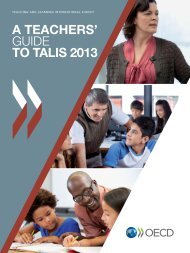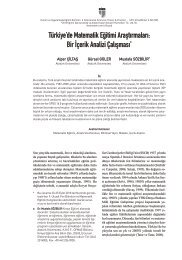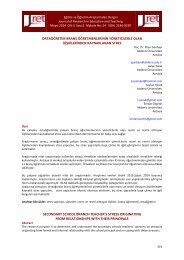bd798f7e557c386e7e231ced888acec57061
bd798f7e557c386e7e231ced888acec57061
bd798f7e557c386e7e231ced888acec57061
- No tags were found...
You also want an ePaper? Increase the reach of your titles
YUMPU automatically turns print PDFs into web optimized ePapers that Google loves.
Educational Sciences: Theory & Practice - 13(1) • Winter • 690-706<br />
©<br />
2013 Educational Consultancy and Research Center<br />
www.edam.com.tr/estp<br />
Examining the Underlying Values of Turkish and German<br />
Mathematics Teachers’ Decision Making Processes in<br />
Group Studies<br />
Yüksel DEDE a<br />
İstanbul Medeniyet University<br />
Abstract<br />
The purpose of this study was to explore the values underlying the decision-making processes in<br />
group studies for Turkish and German mathematics teachers. This study presented a small part of<br />
a wider study investigating German and Turkish mathematics teachers’ and their students’ values<br />
(Values in Mathematics Teaching in Turkey and Germany [VMTG]). The study was conducted with 9<br />
Turkish and 13 German mathematics teachers who were selected with purposeful and theoretical<br />
sampling. Semi-structured interviews and field notes were used as data collection instrument.<br />
Data were analyzed through constant comparative method. Results revealed four different major<br />
categories: (1) productivity, (2) socialization, (3) flexibility/authority, and (4) gender differences.<br />
Based on the findings, discussion, further recommendations, and implications were given at the<br />
end of the study.<br />
Key Words<br />
Decision-making, Values, Group Study, Turkish Mathematics Teachers, German Mathematics Teachers.<br />
In mathematics education, there exists an increase<br />
in the number of publications on affective concepts<br />
such as belief, attitude, and emotion in recent<br />
years (Grootenboer & Hemmings, 2007). With the<br />
inclusion of values in the affective domain components<br />
(DeBellis & Goldin, 1997), researches on<br />
values in mathematics education have recently begun<br />
to appear in the literature, though values have<br />
not been a research priority as attitudes (Hannula,<br />
2004). However, these studies have generally remained<br />
limited to the determination/identification<br />
of culturally western-specific mathematical values<br />
(Bishop, 2004). But, it is highly noted in the relevant<br />
literature that different cultures come up with<br />
different values and even the same mathematical<br />
content is taught with different teaching methodologies<br />
and approaches (see Seah, 2003b). Thus,<br />
lately, research studies on values in mathematics<br />
education have come into prominence in other<br />
cultures, as well (e.g., Dede, 2009, 2011; Durmuş,<br />
2011; Suharjo, 2007).<br />
a<br />
Yüksel DEDE, Ph.D., is currently an associate professor<br />
at the Department of Mathematics Education<br />
His research interests include the affective<br />
domain in mathematics education, particularly<br />
values education in mathematics education. Correspondence:<br />
Assoc. Prof. Yüksel DEDE, Istanbul<br />
Medeniyet University, Faculty of Educational<br />
Sciences, Department of Mathematics Education,<br />
Istanbul/Turkey. E-mail: ydede@medeniyet.edu.tr<br />
Phone: +90 216 2803551 Fax: +90 216 602 2805.<br />
Group Studies in Mathematics Education<br />
Constructivism has been one of the mostly used<br />
concepts in education indices in recent years and<br />
it presents a psychological perspective on the nature<br />
of perception and reality. Constructivism is<br />
a learning theory that deals with the way people<br />
create meaning and points out a set of learning<br />
strategies (Colburn, 2000). It is based on the active<br />
and individual construction of knowledge through<br />
language and experience and encourages learners




